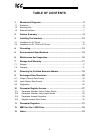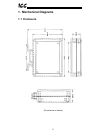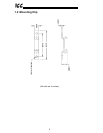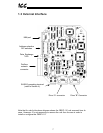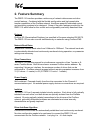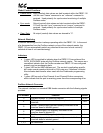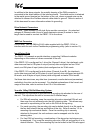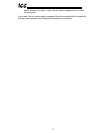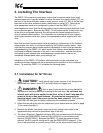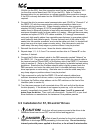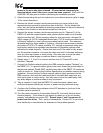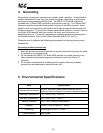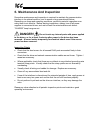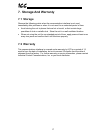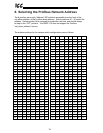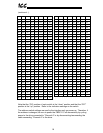
12
3. Installing The Interface
The PBDP-110 connects to each drive via the drive’s common serial (logic level)
communication port, typically located on either the main drive control board (G7), on
the front of the drive enclosure under a small snap-on cover (A7, S9), or on the right-
hand side of the drive enclosure under a small snap-on cover (S7). Although no
drive parameters need to be configured in order to use the PBDP-110, it is
advantageous to check that the drive’s common serial communication data rate is set
to its maximum speed. Because the PBDP-110 will communicate to each drive only
at the drive’s configured data rate, this will provide the fastest response time for
drive-to-network data transfers. For information on checking the drive’s common
serial communication data rate, refer to the appropriate manual supplied with your
drive.
Note that this drive communication data rate setting is independent of the Profibus
network data rate, which is configured solely by the Profibus master station. Also
note that the common serial communication parameters of each drive are handled
independently by the PBDP-110, which means that different drive families may be
connected to different channels of the unit in any combination, and that the drives
connected to each channel may simultaneously communicate to the unit at
completely different baud rates, parity settings, etc.
Installation of the PBDP-110 Profibus interface should only be performed by a
qualified technician familiar with the maintenance and operation of the connected
drives. To install the PBDP-110, complete the following steps:
3.1 Installation for G7 Drives
1.
CAUTION!
Verify that all input power sources to the drives to be
connected have been turned OFF and are locked and tagged out.
2.
DANGER!
Wait at least 5 minutes for the drive’s electrolytic
capacitors to discharge before proceeding to the next step. Do not touch any
internal parts with power applied to the drive, or for at least 5 minutes after
power to the drive has been removed. A hazard exists temporarily for
electrical shock even if the source power has been removed. Verify that the
CHARGE LED has gone out before continuing the installation process.
3. Attach the mounting clip and unit enclosure in your desired manner (refer to page
10 for more information).
4. Remove the drive’s front cover / open the drive’s cabinet door (refer to the
appropriate drive manual for instructions how to do this).
5. The drive’s Electronic Operator Interface (EOI) can communicate with the drive
via either the RS485/RS232 channel (CNU1/CNU1A) or the common serial
channel (CNU2/CNU2A). Because the PBDP-110 uses the common serial
channel, the EOI must be configured to use the RS485/RS232 channel. If the
drive to be connected is currently using CNU2 (on the drive control board) and



